
The United Nations Mission in Sierra Leone (UNAMSIL) was a United Nations peacekeeping operation in Sierra Leone from 1999 to 2006. It was created by the United Nations Security Council in October 1999 to help with the implementation of the Lomé Peace Accord, an agreement intended to end the Sierra Leonean civil war. UNAMSIL expanded in size several times in 2000 and 2001. It concluded its mandate at the end of 2005, the Security Council having declared that its mission was complete.

The United Nations Mission in Liberia (UNMIL) was a United Nations peacekeeping operation established in September 2003 to monitor a ceasefire agreement in Liberia following the resignation of President Charles Taylor and the conclusion of the Second Liberian Civil War (1999–2003). At its peak it consisted of up to 15,000 UN military personnel and 1,115 police officers, along with civilian political advisors and aid workers.
ONUCA was a United Nations peacekeeping mission deployed in Central America in 1990 and 1991.
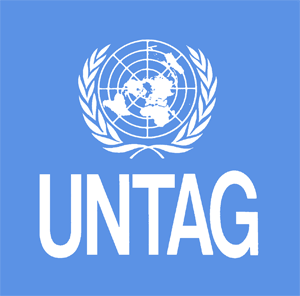
The United Nations Transition Assistance Group (UNTAG) was a United Nations (UN) peacekeeping force deployed from April 1989 to March 1990 in Namibia, known at the time as South West Africa, to monitor the peace process and elections there. Namibia had been occupied by South Africa since 1915, first under a League of Nations mandate and later illegally. Since 1966, South African forces had been combating an insurgency by the People's Liberation Army of Namibia (PLAN), the military wing of the Namibian-nationalist South West African People's Organization (SWAPO). The UN Security Council passed Resolution 435 in 1978, which set out a plan for elections administered by South Africa but under UN supervision and control after a ceasefire. However, only in 1988 were the two parties able to agree to a ceasefire. As UNTAG began to deploy peacekeepers, military observers, police, and political workers, hostilities were briefly renewed on the day the transition process was supposed to begin. After a new round of negotiations, a second date was set and the elections process began in earnest. Elections for the constitutional assembly took place in November 1989. They were peaceful and declared free and fair; SWAPO won a majority of the seats. The new constitution was adopted four months later and it was followed by Namibia's official independence and the successful conclusion of UNTAG.

United Nations Security Council Resolution 637 was adopted unanimously on 27 July 1989. After recalling Resolution 530 (1983) and Resolution 562 (1985) and numerous General Assembly resolutions, the Security Council commended the desire for peace in Central America noting the Joint Declaration made by the Presidents of Central American nations in 1988 and 1989.

United Nations Security Council Resolution 650 was adopted unanimously on 27 March 1990. After recalling resolutions 637 (1989) and 644 (1989), the Security Council endorsed the report by the Secretary-General and decided to authorise an enlargement of the United Nations Observer Group in Central America (ONUCA) in order to demobilise the Contras in Nicaragua.

United Nations Security Council resolution 653, adopted unanimously on 20 April 1990, after recalling resolutions 644 (1989) and 650 (1990), the council endorsed a report by the Secretary-General and authorised new additions to the mandate of the United Nations Observer Group in Central America.

United Nations Security Council resolution 654, adopted unanimously on 4 May 1990, after recalling resolutions 637 (1989), 644 (1989), 650 (1990) and 653 (1990), the council endorsed a report by the Secretary-General and decided to extend the mandate of the United Nations Observer Group in Central America for a further six months until 7 November 1990.

United Nations Security Council resolution 675, adopted unanimously on 5 November 1990, after recalling resolutions 637 (1989) and 644 (1989), the Council endorsed a report by the Secretary-General and decided to extend the mandate of the United Nations Observer Group in Central America for a further six months until 7 May 1991.

United Nations Security Council resolution 691, adopted unanimously on 6 May 1991, after recalling resolutions 637 (1989), 644 (1989) and 675 (1990), the Council endorsed a report by the Secretary-General and decided to extend the mandate of the United Nations Observer Group in Central America for a further six months until 7 November 1991.

United Nations Security Council resolution 698, adopted unanimously on 14 June 1991, after recalling Resolution 682 (1990) dealing with financial issues and all resolutions on Cyprus up to the most recent Resolution 697 (1991), the Council expressed its concern regarding the financial situation facing the United Nations Peacekeeping Force in Cyprus (UNFICYP), established in Resolution 186 (1964).

United Nations Security Council resolution 719, adopted unanimously on 6 November 1991, after recalling resolutions 637 (1989), 644 (1989), 675 (1990) and 691 (1991), the Council endorsed a report by the Secretary-General and decided to extend the mandate of the United Nations Observer Group in Central America for a further five months and twenty-three days until 30 April 1992.

United Nations Security Council resolution 730, adopted unanimously on 16 January 1992, after recalling resolutions 719 (1991) and 729 (1992) the Council approved a report by the Secretary-General from 14 January, and decided to terminate the mandate of the United Nations Observer Group in Central America (ONUCA) with effect from 17 January 1992.
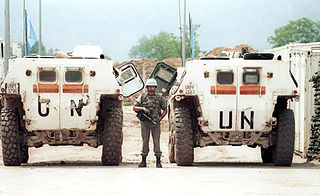
United Nations Security Council resolution 743, adopted unanimously on 21 February 1992, after reaffirming resolutions 713 (1991), 721 (1991), 724 (1991), 727 (1992) and 740 (1992), and considering that the situation in the Socialist Federal Republic of Yugoslavia constituted a threat to international peace and stability, the council established a peacekeeping mission in the country, known as the United Nations Protection Force (UNPROFOR), with the aim of reaching a peaceful political settlement in the region.
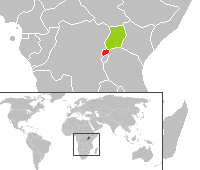
United Nations Security Council resolution 846, adopted unanimously on 22 June 1993, after reaffirming Resolution 812 (1993) on the situation in Rwanda and noting a report by the Secretary-General Boutros Boutros-Ghali, the council established the United Nations Observer Mission Uganda–Rwanda (UNOMUR) for an initial period of six months.

United Nations Security Council resolution 858, adopted unanimously on 24 August 1993, after recalling resolutions 849 (1993) and 854 (1993) and noting a ceasefire between Abkhazia and Georgia and commitments to withdraw forces, the council established the United Nations Observer Mission in Georgia (UNOMIG) for an initial period of 90 days pending further extension.
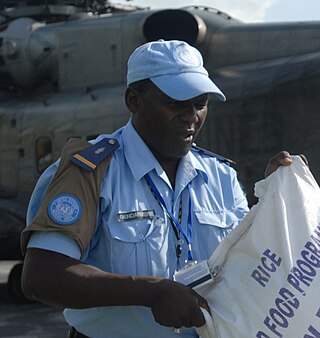
United Nations Security Council resolution 867, adopted unanimously on 23 September 1993, after recalling resolutions 841 (1993), 861 (1993) and 862 (1993) on the situation in Haiti, the council reiterated its position of protecting international peace and stability and established the United Nations Mission in Haiti (UNMIH).

United Nations Security Council resolution 968, adopted unanimously on 16 December 1994, after noting statements by the president of the security council and reports by the Secretary-General Boutros Boutros-Ghali on the situation in Tajikistan, the council established the United Nations Mission of Observers in Tajikistan (UNMOT) and addressed the process of national reconciliation in the country.
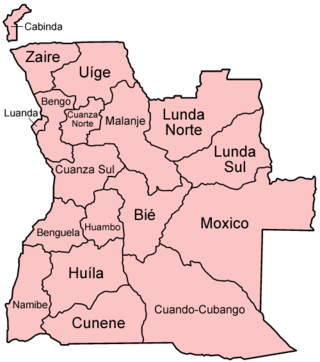
United Nations Security Council resolution 1118, adopted unanimously on 30 June 1997, after reaffirming Resolution 696 (1991) and all subsequent resolutions on Angola, the council established the United Nations Observer Mission in Angola (MONUA) to supersede the United Nations Angola Verification Mission III.
United Nations Security Council resolution 1181, adopted unanimously on 13 July 1998, after recalling all previous resolutions on the situation in Sierra Leone, the council established the United Nations Observer Mission in Sierra Leone (UNOMSIL) to monitor the military and security situation in the country for an initial period of six months until 13 January 1999.












